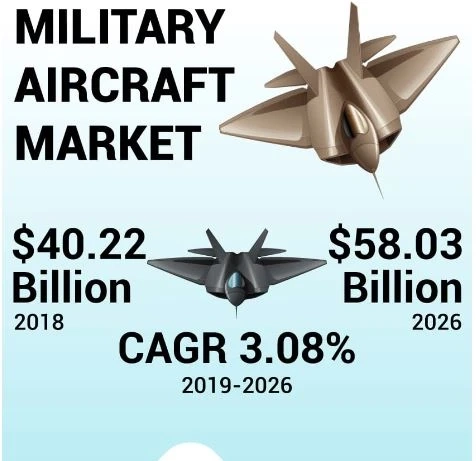The global military aircraft market size was valued at USD 40.22 billion in 2018 and is projected to reach USD 58.03 billion by 2026, exhibiting a CAGR of 3.08% during the forecast period.
The global military aircraft market is experiencing significant growth, fueled by rising defense budgets, geopolitical tensions, and technological advancements. A recent market research study provides comprehensive insights into the key factors driving this growth, along with segmentation, key players, latest trends, and key market insights.
Browse Report:
https://www.fortunebusinessinsights.com/military-aircraft-market-102771
Segmentation: Military Aircraft Market
The military aircraft market is segmented based on aircraft type, mission type, and region.
Aircraft Type:
Fighter Jets
Bombers
Reconnaissance Aircraft
Transport Aircraft
Others
Mission Type:
Air-to-Air
Air-to-Ground
Intelligence, Surveillance, and Reconnaissance (ISR)
Maritime Patrol
Others
Region:
North America
Europe
Asia-Pacific
Middle East & Africa
Latin America
Key Players: Military Aircraft Market
The competitive landscape of the military aircraft market includes key players that play a pivotal role in shaping the industry. Some of the prominent companies in the market are:
Lockheed Martin CorporationBoeing CompanyNorthrop Grumman CorporationAirbus SEBAE Systems plcRaytheon Technologies CorporationSaab ABLeonardo S.p.A.General Dynamics CorporationDassault Aviation S.A.Key Market Insights:
Increasing Defense Budgets: The global rise in defense budgets, particularly in countries with geopolitical tensions, is a major factor driving the growth of the military aircraft market. Nations are investing heavily in modernizing their defense capabilities, leading to a surge in demand for advanced military aircraft.
Technological Advancements: The market is witnessing a shift towards technologically advanced aircraft, incorporating features such as stealth technology, enhanced avionics, and unmanned systems. This trend is driven by the need for superior performance, survivability, and mission effectiveness.
Global Geopolitical Landscape: Rising geopolitical tensions in various regions are compelling nations to strengthen their defense capabilities, contributing to the increased procurement of military aircraft.
Latest Trends: Military Aircraft Market
Unmanned Aerial Vehicles (UAVs): The integration of UAVs in military operations is a prominent trend in the military aircraft market. UAVs offer cost-effective solutions for surveillance, reconnaissance, and combat missions.Stealth Technology: There is a growing emphasis on stealth technology to enhance the survivability of military aircraft. Manufacturers are investing in research and development to create stealthy and sophisticated platforms.Multi-role Capabilities: Military aircraft with multi-role capabilities are gaining popularity, providing flexibility and adaptability in various mission scenarios.Driving Factors:
Modernization Initiatives: Nations are actively modernizing their military fleets, replacing aging aircraft with advanced platforms to maintain a strategic edge over potential adversaries.
Global Threat Environment: The evolving global threat environment is prompting countries to invest in military capabilities, including advanced aircraft, to address emerging challenges.
Increasing Focus on Air Superiority: The importance of air superiority in modern warfare is driving the demand for advanced fighter jets and air-to-air capabilities.
In conclusion, the global military aircraft market is poised for substantial growth, driven by increased defense spending, technological advancements, and evolving geopolitical dynamics. The industry's future will likely see continued innovation and collaboration among key players to meet the evolving needs of defense forces worldwide.



